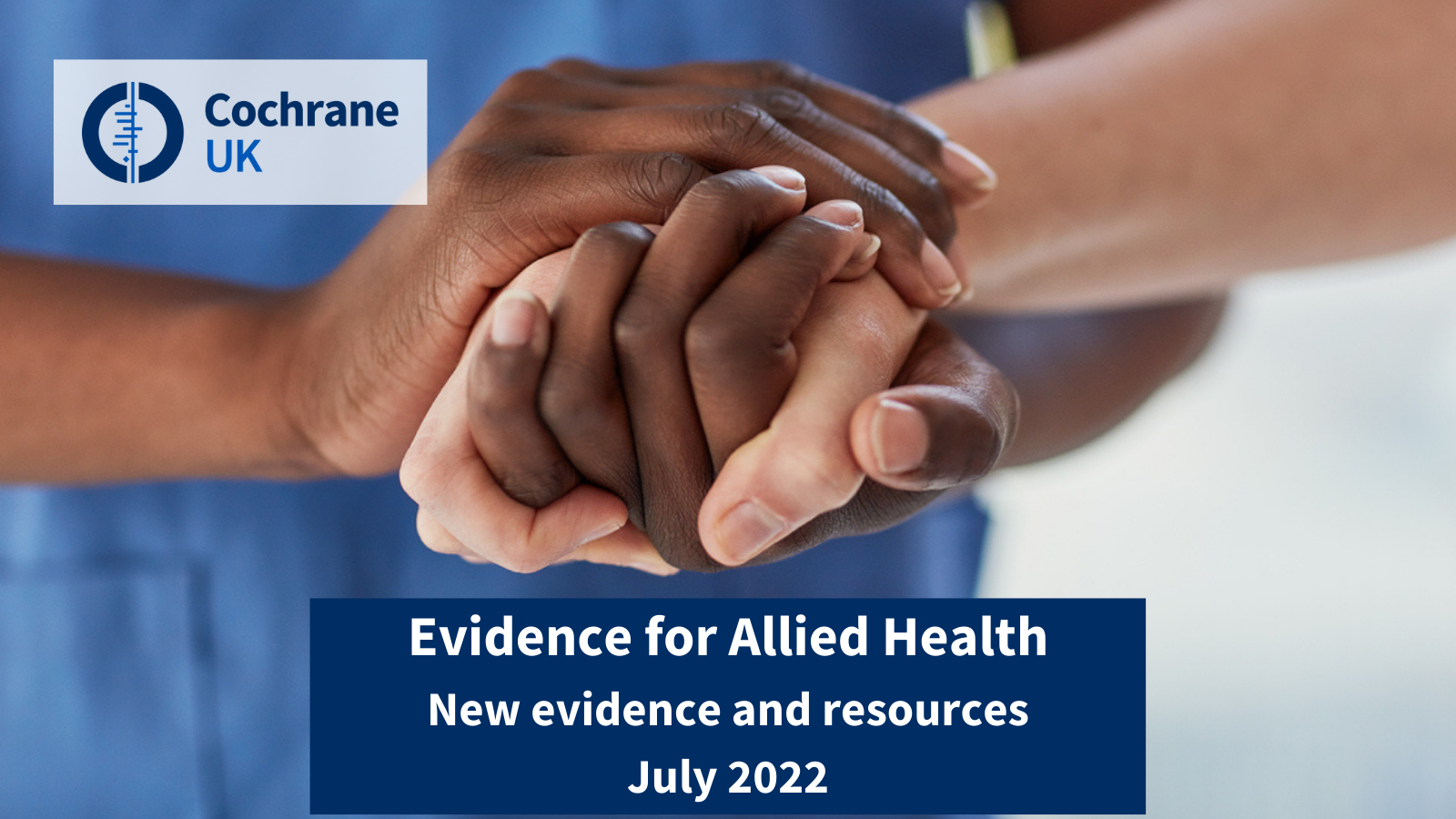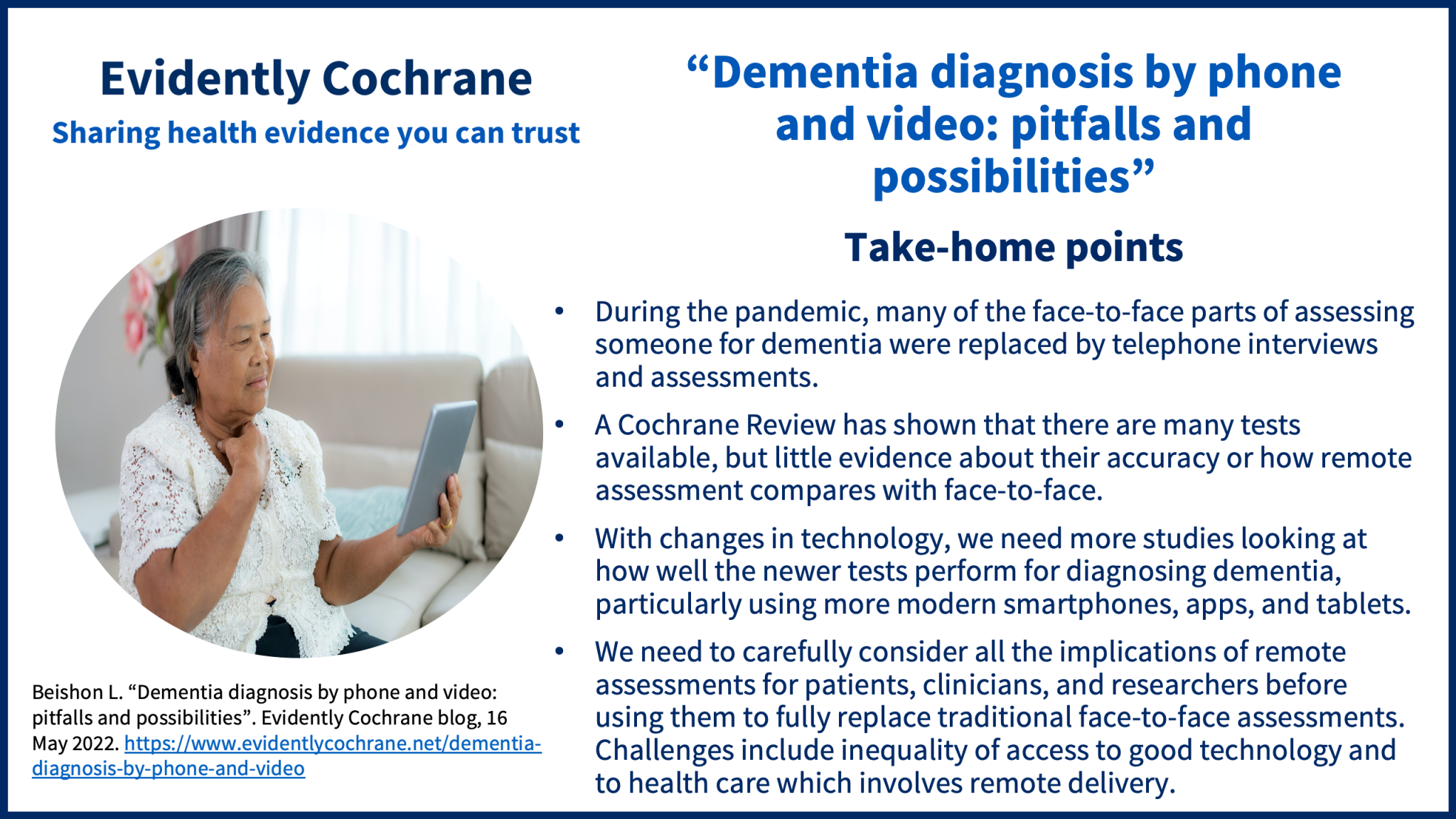The latest evidence and resources for allied health professionals and clinical support staff, and a chance to help us improve these blogs. You can either scroll through this page or click on any of the links below to jump to the relevant section.
Please note, unlike the rest of our blogs, our ‘Evidence for Allied Health: new evidence and resources’ blogs will not be updated.
- Your feedback: can you help us find out whether our regular evidence round-up blogs are useful and how we can make them better?
- COVID-19
- Assisted reproduction
- Asthma
- Bronchiolitis
- Chronic obstructive pulmonary disease (COPD)
- Dementia: remote assessment
- Discharge planning
- Medication reconciliation
- Mobility training for older people with frailty
- Music therapy
- Parkinson’s disease: preventing falls
- Physiotherapy for adults with complex regional pain syndrome
- Pressure ulcers (pressure injuries)
- Smoking cessation
- News and opportunities
2
Cochrane UK needs you!
2
COVID-19
Cochrane is continuing to produce new and updated reviews in response to the pandemic. We have blogged about many of them and this blog COVID-19 evidence: a Cochrane round-up brings together a large collection of evidence and resources, starting from when this evidence was first being produced in spring 2020.
Plus, we have two blogs on COVID-19 treatments:
Like the reviews themselves, all our blogs are updated to reflect new evidence.
Cochrane Special Collections
Cochrane Special Collections assemble Cochrane Reviews on important topics for the prevention and treatment of COVID-19. They are developed with experts from our global Cochrane network. They are based on World Health Organization interim guidance, and continuously updated.
You can find Coronavirus (COVID-19) Special Collections here including Coronavirus (COVID-19): infection control and prevention measures and Coronavirus (COVID-19): evidence relevant to acute and critical care which were updated in June 2022.
Cochrane Podcasts
Cochrane COVID-19 Podcasts offer short summaries of Cochrane COVID-19 reviews from the authors themselves. A good way to hear the latest Cochrane evidence in under 5 minutes each.
The collection includes the recent podcast Do blood thinners prevent people who are hospitalised with COVID-19 from developing blood clots?
Cochrane Clinical Answers
Cochrane Clinical Answers (CCAs) provide a readable, digestible, clinically-focused entry point to rigorous research from Cochrane Reviews. They are designed to be actionable and to inform point-of-care decision-making. Each CCA contains a clinical question, a short answer, and data for the outcomes from the Cochrane Review deemed most relevant to practising healthcare professionals.
Recent Cochrane Clinical Answers addresses these questions:
- What is the accuracy of World Health Organization (WHO)‐specified and related COVID‐19 symptoms for the diagnosis of COVID‐19?
- What are the effects of janus kinase (JAK) inhibitors for people with moderate to severe COVID‐19?
- You can find more Cochrane Clinical Answers related to COVID-19 here
3
Assisted reproduction
Cochrane Clinical Answer: In assisted reproductive technology, what are the effects of cleavage stage versus blastocyst stage embryo transfer?
4
Asthma
Digital technologies may help people with asthma adhere better to their treatment and improve asthma control, conclude the authors of the Cochrane Review Digital interventions to improve adherence to maintenance medication in asthma (June 2022). You can find out more in this article: Featured Review: Digital technologies to help people with asthma take their medication as prescribed.
5
Bronchiolitis
Cochrane Clinical Answer: How does parenteral compare with enteral fluid therapy for children hospitalized with bronchiolitis?
6
Chronic obstructive pulmonary disease (COPD)
Health professional education
The authors of the Cochrane Review Educational interventions for health professionals managing chronic obstructive pulmonary disease in primary care (May 2022) conclude that “The evidence of efficacy was equivocal for educational interventions for health professionals in primary care on the proportion of COPD diagnoses confirmed with spirometry, the proportion of patients with COPD who participate in pulmonary rehabilitation, and the proportion of patients prescribed guideline‐recommended COPD respiratory medications. Educational interventions for health professionals may improve influenza vaccination rates among patients with COPD and patient satisfaction with care.”
Self-management
Cochrane Clinical Answer: What are the effects of self‐management for people with chronic obstructive pulmonary disease (COPD)?
7
Dementia: remote assessment
In the blog Dementia diagnosis by phone and video: pitfalls and possibilities, Lucy Beishon, specialist trainee in geriatric medicine and NIHR Academic Clinical Lecturer in Geriatric medicine, talks about evidence from her Cochrane Review Diagnostic test accuracy of remote, multidomain cognitive assessment (telephone and video call) for dementia (April 2022), reflects on her experiences during the pandemic, and looks to the future.
8
Discharge planning
Cochrane Clinical Answer: How does discharge planning affect outcomes in older adults with medical (non‐surgical) conditions?
9
Medication reconciliation
Cochrane Clinical Answer: In adults admitted to hospital, does medication reconciliation help reduce medication errors?
10
Mobility training for older people with frailty
The Cochrane Review Mobility training for increasing mobility and functioning in older people with frailty (June 2022) has high-certainty evidence that, compared to control, “mobility training improves the level of mobility” to an extent that is clinically important. The benefit was still seen six months after the intervention.
Mobility training also “likely improves the level of functioning upon completion of the intervention…[but] this benefit did not appear to be maintained six months after the intervention.”
The effect of mobility training on adverse events is uncertain.
Mobility training may make little to no difference in the number of people who are admitted to nursing care facilities at the end of the intervention, or to the number of people who fall, or to the death rate.
11
Music therapy
There are two recent Cochrane Reviews on music therapy.
Key messages from Music therapy for autistic people (May 2022) are:
- “Music therapy compared with ‘placebo’ therapy or standard care
- probably increases the chance of overall improvement by the end of therapy
- probably helps to enhance quality of life, and lessen symptom severity
- probably does not increase adverse events.
- We cannot tell whether music therapy may help with social interaction, non‐verbal communication and verbal communication at the end of therapy.”
The authors also note that most of the included studies explored interventions that correspond well with music therapy in clinical practice.
Key messages from Music therapy for people with substance use disorders (May 2022) are:
- “Music therapy as ‘add on’ treatment to standard care likely reduces substance craving and increases motivation for treatment for adults in detoxification and rehabilitation settings.
- Music therapy lasting longer than a single session is associated with greater reductions in substance craving.
- There is no evidence of an effect on depressive symptoms, anxiety, motivation to stay sober/clean, or retention in treatment.
- There were no data on adverse events.”
We have a blog on a number of reviews on this topic – Music therapies: what’s the evidence?
12
Parkinson’s disease: preventing falls
The authors of the Cochrane Review Interventions for preventing falls in Parkinson’s disease (June 2022) conclude:
“Exercise interventions probably reduce the rate of falls, and probably slightly reduce the number of people falling in people with mild to moderate PD. Cholinesterase inhibitors may reduce the rate of falls, but we are uncertain if they have an effect on the number of people falling. The decision to use these medications needs to be balanced against the risk of non fall‐related adverse events, though these adverse events were predominantly mild or transient in nature.”
13
Physiotherapy for adults with complex regional pain syndrome
The Cochrane Review Physiotherapy for pain and disability in adults with complex regional pain syndrome (CRPS) types I and II (May 2022) highlights a continued evidence gap. The authors conclude “The evidence is very uncertain about the effects of physiotherapy interventions on pain and disability in CRPS”.
14
Pressure ulcers (pressure injuries)
Blog: Pressure ulcers (pressure injuries): evidence and resources. On this page, you can find Cochrane evidence on preventing and treating pressure ulcers (pressure injuries), including resources that aim to make it useful and accessible, as well as links to the reviews themselves.
15
Smoking cessation
Cochrane Clinical Answer: How do heated tobacco products (HTPs) and cigarette smoking compare in terms of safety?
16
News and opportunities
A free course: How to talk about vaccines when you’re not an expert: a Lifeology and Cochrane collaboration.
Join in the conversation on Twitter with @SarahChapman30 and @CochraneUK or leave a comment on the blog.
Please note, we cannot give medical advice and do not publish comments that link to individual pages requesting donations or to commercial sites, or appear to endorse commercial products. We welcome diverse views and encourage discussion but we ask that comments are respectful and reserve the right not to publish any we consider offensive. Cochrane UK does not fact-check – or endorse – readers’ comments, including any treatments mentioned.
Sarah and Selena have nothing to disclose.




Great to see the latest evidence and resources compiled for allied health professionals and clinical support staff. In today’s fast-paced world, having access to reliable information is crucial, which is why telemedicine platforms can be game-changers. By combining trusted research with convenient telemedicine services, healthcare professionals can stay informed and provide the best care. Keep up the great work, and remember to explore innovative solutions for enhanced healthcare delivery.